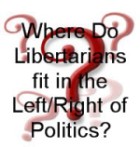Debating marriage and freedom
In response to a Reason Magazine article I recently linked to:
Anonymous said...
John Coleman has an interesting idea,
but I don't think he makes a brilliant case for privatizing marriage. Maybe it's
your use of the word "church" that is confusing me. Marriage is an older
institution than church, if church refers to Christianity. I think he is
recommending that marriage be a religious rite only, not a legally binding
agreement between spouses. Correct? Wouldn't that be pretty much the same as
doing away with marriage?
F2S says:
There are two levels from which it is instructive to approach this issue: the philosophical and the practical. The philosophical is perhaps the easier to deal with. Freedom of association is the Constitutional objective. This implies both a positive and negative right. Free to come together into any group of two or more to pursue any issue, or interest, or lack there of. No justification is necessary so long as freedom is the standard. The flip side is freedom from. One should not be compelled by the pressure of any freely established group to which one has not freely entered into. When government grants a blessing of status or privilege onto any group freely constituted, it implicitly violates the rights of any citizen not belonging to such a group. So then for government to grant privilege, status or rights exclusively to a married couple based on the nature of that association, it violates a fundamental constitutional obligation, to preserve the right to freely associate.
The practical question is more complex. As anonymous points out, I was being sloppy when when I used the word "church" exclusively and failed to articulate the contract law approach to coupling. I also failed to define marriage in the context in which I used it. I use marriage in the narrowest sense of the word; as a definition of the union of a man and a woman sanctified by a church. I certainly don't mean to define "church" as Christian or any thing else, but rather to point out that this rite is, or should be, completely separate from any question of civil obligation or restriction based upon association. Marriage is simply a definition of a type of relationship, like partner, comrade or associate. None of these carry a de facto legal or contractual obligation. They are simply ways of contextualizing the nature of a relationship. Going to Anonymous question about rite v. Contract, I think he pretty much nails it. Marriage should be exclusively a rite, but far from doing away with marriage, this would take it away from policymakers and give it into the hands of the priests and preachers who will cherish and preserve it.
Marriage, as I have defined it, is a religious rite completely separate from any civil obligation, but that does not prevent one from entering into a contract with whomever they wish and assuming for themselves the obligations that such a contract would carry. Is that marriage or something short of it? That is only for those entering into such a union to define.
Today a couple (if constituted in such a way as to be acceptable to the authorities) can go to a courthouse and obtain a civil "marriage" without any church blessing that union. Is that really a marriage or just a civil contract? If it is just a contract, then how, given the freedom of association argument, can civil authorities deny that contract to same-sex couples, polygamists or any other sovereign citizens wishing to freely contract with each other?
On a seperate point, I would take exception to Anonymous's assertion that "marriage" is older then the church. Coupling for the sake of protection and procreation is certainly older then the church, but marriage as an institution is, traditionally, the sactification of a coupling before a god or gods. This predates Christianity, as Anynomous rightly points out, but not association based on religion.
*************************************************************

 Contact Me
Contact Me








2 Comments:
Okay, marriage may not predate religion. There is no way to argue that. But another idea that creeps into my mind is that most religious institutions either are now or have been at one time ruling (and despotic) governments in their own right, and if Pat Robertson had his way...
Anyway, let's say that the legal priveleges and obligations of marriage were modified so that every citizen had equal status, then there would be no legal or economic discrimination on singles, gays, live-in partners or live-in groups. I think that would be fine. But there is more to it than that, isn't there? Our society thinks that people ought to be married. It is not just a sign of devoutness, but a measure of maturity, stability, responsiblilty. Some people believe so strongly in marriage that they do it over and over again. Civil marriage exends this status to the non-believer, those who choose to marry someone of another faith, or those whose marriages are forbidden by religious doctrine. Unfortunately, it also gives demogogues something to beat us over the head with: "Sanctity of marriage", goes the battle cry, as if I need some politician to bless my three decades of matrimony. So there you go, I have written myself into a circle on this enjoyable debate. Sorry this is so long, don't feel obligated to post it. I may at some point have to get my own blog.
Yo know, studies have shown that married people live longer, are happier and wealthier then their single counterparts. Maybe that makes it it's own reward. - F2S
Post a Comment
<< Home